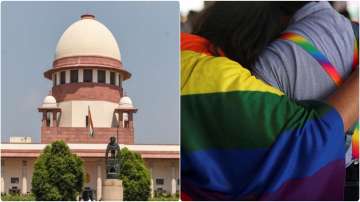Same-sex marriage: The Supreme Court is set to hear a batch of petitions seeking recognition of same-sex marriage on April 18. According to reports, a five-judge bench headed by the Chief Justice of India (CJI), DY Chandrachud will hear the matter. The bench is likely to comprise CJI and justices Sanjay Kishan Kaul, S Ravindra Bhat, Hima Kohli, and PS Narasimha.
While referring the matter to a constitution bench on March 13, the top court had underlined that it is a very crucial issue. "It is a very seminal issue. The proceedings will be live-streamed," the bench stated.
Representing the Centre, Solicitor General Tushar Mehta had contended before the court that the right to love or right to express one's love irrespective of the gender of the other person is completely different from what the court would find the mechanism to give recognition or to give a sanctity by way of an institution called marriage.
What Centre contended on the matter?
Mehta had stressed that freedom of choice has already been recognised by the apex court and no one was interfering with those rights, but conferring the right of marriage fell in the exclusive domain of the legislature.
He further contended that if marriage is recognised between the same sex, the question will be of adoption, as the child would see either two men or two women as parents, and not be reared by a father and a mother.
He added that the Parliament will then have to debate and take a call, in view of societal ethos and several other factors, whether same-sex marriage needs to be recognised.
The Centre, in an affidavit, contended that legal validation of same-sex marriage will cause "complete havoc" with the delicate balance of personal laws in the country and in accepted societal values. The Centre stressed that legislative policy recognises marriage as a bond only between a biological man and a biological woman.
ALSO READ: Legalising 'same-sex marriage' in India will have devastating impact on society, say Former High Court judges
Centre opposes pleas
The Central government said that living together as partners and having a sexual relationship by same-sex individuals, which is decriminalised now, is not comparable to the Indian family unit - a husband, a wife, and children born out of the union - while opposing pleas seeking recognition of same-sex marriage.
It stressed that same-sex marriage is not in conformity with societal morality or Indian ethos. In the affidavit, the Centre said the notion of marriage itself necessarily and inevitably presupposes a union between two persons of the opposite sex. This definition is socially, culturally, and legally ingrained into the very idea and concept of marriage and ought not to be disturbed or diluted by judicial interpretation, it added.
(With IANS inputs)
Latest India News

